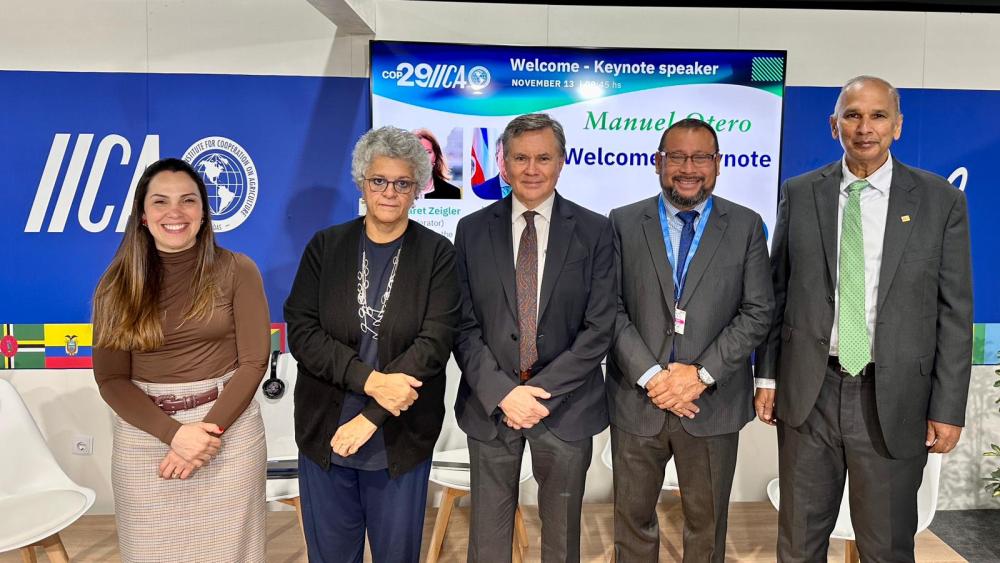The pavilion installed at the United Nations Conference in Baku, the capital city of Azerbaijan, brought together farmers, private sector players and senior agricultural officials of the Americas to discuss the future of the sector, with a particular emphasis on the economic, social and environmental sustainability of animal production.

Baku, Azerbaijan, 13 November 2024 (IICA) –Speaking at COP29—the world’s premier environmental negotiation forum—the production sector of the Americas demonstrated how sustainable livestock production in the region is increasing its capacity to provide a solution to the climate crisis.
The pavilion installed at the United Nations Conference in Baku, the capital city of Azerbaijan, brought together farmers, private sector players and senior agricultural officials of the Americas to discuss the future of the sector, with a particular emphasis on the economic, social and environmental sustainability of animal production.
The participants included José Abelardo Mai, Minister of Agriculture and Food Security of Belize; Mayara Jungles, Sustainability Manager of the animal protein heavyweight BRF/Marfrig; Izabella Teixeira, former Minister of the Environment and Climate Change of Brazil; and Muhammad Ibrahim, Director of Technical Cooperation of IICA.
Margaret Zeigler, IICA Representative in the United States, moderated the discussion, whereas IICA Director General, Manuel Otero, offered the opening remarks and commented on the vital importance of the event.
“Here we are, speaking about the future of agriculture, and we cannot support the accusation that animal production is a villain. Livestock production is essential for food security; and, from an economic and social perspective, is also vital for Latin America and the Caribbean – a region where most producers are small and medium-scale farmers. The region accounts for 26% of global animal production and 33% of total exports. Therefore, it plays an incomparable role”, said Otero.
The IICA Director General explained that livestock production in Latin America and the Caribbean is undergoing a transformation process, becoming increasingly efficient and reducing its greenhouse gas emissions. He maintained that, “We must boost investments in science and innovation, promote trade without distortions and be proud of our production sector, to continue along the same path”.
The private sector and sustainability
Mayara Jungles provided a detailed explanation of progress in the decarbonization plan of BRF/Marfrig, one of the largest food companies in the world, which has been in existence for almost 90 years and impacts the lives of millions of people.
Jungles expressed the view that Latin America is crucial for global food security and indispensable for environmental sustainability, given that its forests serve as a carbon sink.
“Being sustainable and preserving biodiversity are the principles that guide us. We encourage producers to adopt best practices; and we monitor deforestation in the Brazilian Amazon and Cerrado biomes. We have set greenhouse gas emission targets and established special capacity building programs for small farmers, to whom we provide technical support to fulfil environmental regulations”, she specified.
Teixeira, Special Advisor to IICA for G20 and for the COP29 and COP30 meetings, emphasized the need to give greater impetus to science and innovation to promote climate change adaptation, for example, through genetic modifications that facilitate adaptation to the limited water availability.
She noted that, “The region must develop an innovative, climate change negotiation agenda, which is essentially political, not only for the Conference of the Parties (COP) to the Convention, but also for spheres such as the G20, the G7 and the Davos Forum”.
“Our obligation is to produce more food in a way that decreases the impact on the natural environment in this vulnerable region. This has serious political implications, so the public and private sectors must work together. The future is already here and we are facing daunting challenges”, she warned.
Jose Abelardo Mai also underscored the importance of the region for food security and the fight against climate change, given its productive capacity and biodiversity.
“Let’s not forget that corn is indigenous to the Americas and that many of the most important foods in the world come from our hemisphere. The United States and Canada are major wheat, corn and soybean producers. We have Mexico that produces avocado; coffee and cocoa from Central America; potatoes from the Andes and the magnificent meat from Argentina and Brazil”. We produce for the Americas and the rest of the world”, said the Belizean minister.
Mail spoke of the importance of IICA’s technical cooperation for sustainable development in Belize and noted that Central American producers have now learned that there is no need to cut down trees to carry out livestock farming.
The minister also spoke of the adversities facing Central American farmers due to climate change, noting that, “It was difficult to come to COP29, while we continue to face problems at home. It is critical that international agreements on climate ambition be honored and that developing countries be provided with international financing”.
Ibraham argued that Latin America would continue to play an irreplaceable role in supplying animal protein and ensuring global food and nutrition security. However, he warned that the sector would need to make more efficient use of natural resources, given the impact of climate change.
He acknowledged that, “At the social level, we are vulnerable. We have an ageing rural population and thus, we must involve young people, to foster prosperity in the countryside. Livestock production is essential and today, thanks to silvopastoral systems, we are reducing emissions and contributing to ecosystem conservation. We have made great strides and many countries of the region are now including animal production in their climate mitigation commitments, as part of the solution”.
More information:
Institutional Communication Division.
comunicacion.institucional@iica.in











